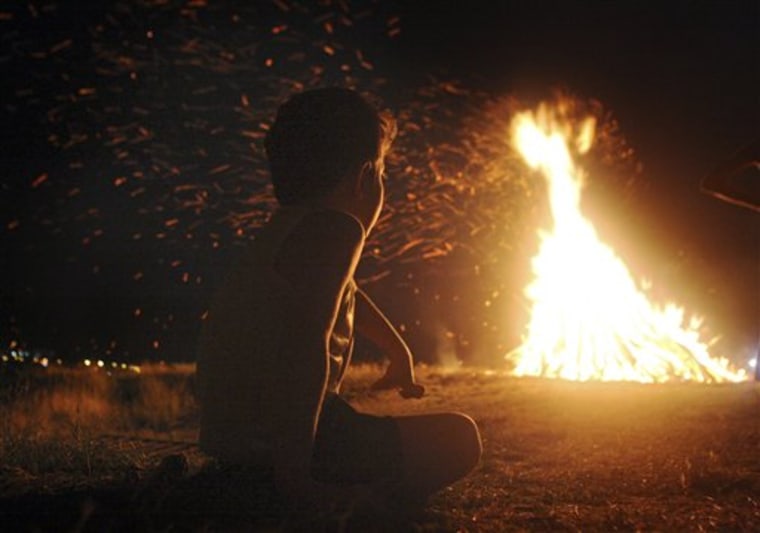Georgia and the Moscow-backed breakaway province of South Ossetia marked the first anniversary of their conflict Friday with harsh words and quiet, glum ceremony.
The five-day war, with Russian troops and tanks backing South Ossetian forces, killed at least 390 people, displaced tens of thousands and left a legacy of animosity between leaders and fears among civilians that more fighting may erupt.
South Ossetia, now recognized by Russia and almost no other country as independent, is cut off from the rest of Georgia by military checkpoints. Thousands of Russian troops are based in South Ossetia, supporting local forces widely alleged to have killed ethnic Georgian civilians, burned their houses and driven them at gunpoint from the region.
Georgian soldiers man positions a few hundred yards away from the boundary line, and European Union monitors survey the tense area, using binoculars to view the South Ossetian side, which Russia refuses to allow them to enter. Both sides have claimed the other fired mortars or shot at them in recent weeks.
"We feel there is a great danger in the current situation. All my close friends and relatives are very worried. We can only place our faith in God and the international community," said Lia Tabukashvili, a resident of the Georgian capital who was visiting a small memorial to war victims on the steps of the parliament.
Russian President Dmitry Medvedev, meanwhile, defended his decision to go to war.
"Each time I remember these events, I scroll the tape backward, as they say, and realize that on the one hand, we had no other choice," he said in a statement released by the Kremlin.
'War they created'
Tbilisi's main avenue, Rustaveli Prospekt, was closed to traffic for a photo exhibition on Russia's control, or occupation, of Georgia during czarist and Soviet times. But only a few, desultory pedestrians inspected the displays before a midday rain drove people indoors.
Several hundred people braved the rain to form a human flag display at the ruins of a medieval fortress in Gori.
Gori, about 50 miles west of Tbilisi, is a focus of the war commemorations: The city of 50,000 was bombed when the war spread into Georgia proper from South Ossetia, whose capital Tskhinvali is about 20 miles to the north.
Georgian President Mikhail Saakashvili is to speak in the evening at the fortress, an appearance that culminates Georgia's observances. Saakashvili attended a wreath-laying at a military cemetery in Tbilisi.
At the cemetery, a 2-year-old boy in a tiny military uniform stood by the grave of his father Emzar Tsilosani, who was killed in the war.
"He will be a soldier, like his father," said widow and mother Teona Tsilosani. "But Emzar is not coming back — that's what Russia brought upon us with this war they created."
Sides trade blame
A year later, dispute over what started the war remains heated. Russia and South Ossetia contend it began with a thunderous Georgian artillery assault on Tskhinvali and that Moscow sent in troops to protect Russian peacekeeping forces and civilians; Georgia says it launched the barrage to try to repel Russian tanks and troops that had begun an invasion before dawn.
South Ossetia alleges the attack on Tskhinvali was genocide.
On Friday, South Ossetian leader Eduard Kokoity claimed Georgian forces massacred civilians on a road as they tried to escape the Tskhinvali attack.
"The refusal of Georgia or its Western supporters to even acknowledge this massacre is proof of the moral failure by the leaders responsible for last year's war," he said in a statement. "This is not the fault of Georgian citizens, but of President Saakashvili and his military officers making a deliberate and horrible decision to kill innocent people. Why do U.S. and European leaders continue to support such men?"
'Place drenched in the blood'
A Russian Orthodox priest and Cossacks from Moldova's separatist province of Trans-Dniester erected a cross and placed icons near the ruined barracks of Russian peacekeepers on Tskinvali's southern outskirts Friday. The barracks came under heavy Georgian shelling in the opening hours of the conflict.
"This place is drenched in the blood of our soldiers who stood up against the Georgian aggression," Father Andrei Zizo said.
Russia and South Ossetia claim Saakashvili retains ambitions to seize control of South Ossetia by force and have denounced Western military aid to Georgia. Saakashvili and other Georgian officials say Russia wants to drive him from power because it resents his efforts to bring Georgia into NATO and the European Union.
About 26,000 people displaced by the conflict are still living in temporary housing in Georgia, many of them on less than $3 a day, according to the international humanitarian organization World Vision.
